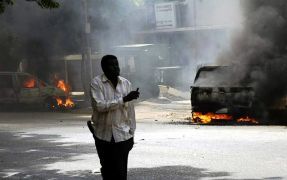Sudanese clash after Garang’s death
By TANALEE SMITH
KHARTOUM, Sudan, Aug 2, 2005 (AP) — Sudan’s capital erupted into ethnic and sectarian conflict Tuesday, with bands of northerners and southerners staging attacks on each other in an outpouring of anger sparked by the death of a former rebel leader turned vice president.

|
|
A Sudanese protester walks in front of burning cars in the capital Khartoum, August 1, 2005. (Reuters). |
Frightened residents carried clubs and bricks for protection, fearful of the deadly reprisal violence between Muslim Arabs and residents from Sudan’s south enraged over the death of John Garang, killed Saturday when his helicopter crashed into a southern mountain range in bad weather.
At least 49 people were killed in the violence that started Monday, according to a U.N. official, though the number was not officially confirmed. The official spoke on condition of anonymity because he was not authorized to talk to journalists.
Armed gangs, said to be Arabs, broke into homes of southerners in several parts of the capital. Television footage showed southerners’ homes torn apart, furniture smashed and doors hanging on hinges.
At the same time, Muslim neighborhoods came under attack by supporters of Garang, who led a two-decade rebellion in Sudan’s mostly Christian and animist south before becoming the country’s vice president in a peace deal.
A dusk-to-dawn curfew was declared for the second night in a row. In the evening, four armored vehicles sat parked on a downtown street, facing the direction of Omdurman, Khartoum’s sister-city across the Nile, where some of the worst clashes were reported.
The death of Garang ruptured the long coexistence in Khartoum between northerners and the nearly 2 million southerners who live in squatter neighborhoods in the city and in four massive refugee camps on its outskirts.
Violence between the communities has been uncommon, even during the 21-year civil war between Garang’s rebels and the Khartoum government, which is dominated by Muslim Arabs. The war was fought hundreds of miles to the south and drove thousands of southerners to the capital.
Garang’s death came only three weeks after he was named first vice president and joined the government that had long been his enemy, part of a peace deal celebrated throughout the conflict-torn country.
The government and Garang’s Sudan People’s Liberation Movement insist the crash was an accident and have been trying to bring calm by promising that the peace process will continue.
But southerners rampaged in Khartoum on Monday, many blaming the government for Garang’s death. The rioting left 36 dead, according to the government.
Armed Arab gangs raided the homes of some neighborhoods heavily populated by southerners on Khartoum’s outskirts, said William Ezekiel, managing editor of the Khartoum Monitor, which focuses largely on southern issues.
Another report said northerners attacked a school, killing six or seven people, including children.
Angry southerners from camps outside the capital attacked and looted markets in Omdurman and killed a Muslim imam, the senior U.N. official in Khartoum said.
Throughout the day, tribal leaders – who have more influence than government officials with many people – appealed for calm in TV and radio messages.
Minimal police presence was seen on the streets in the morning, despite the violence the day before, and it wasn’t until afternoon that riot police and soldiers deployed larger units. In the evening, some neighborhoods that had seen trouble were filled with a heavy military presence.
Ezekiel later said he saw seven trucks filled with southerners, some with their hands tied, being taken to a police station.
Many of Khartoum’s police forces trained to deal with riot situations are currently in Darfur to help with security in that troubled western region.
Other cities, including Wad Medani in the east and Juba in the south, also reported violence, but the clashes there were largely seen as a display of grief and anger over Garang’s death and not as a collapse of security.
The government and the rebel movement were eager to show the power-sharing deal between north and south would continue, amid fears its collapse could lead to a return to civil war.
President Omar al-Bashir will travel south to the town of Juba to attend Garang’s funeral, set for Saturday, state media reported. His attendance aimed to signal that both sides consider themselves partners. Al-Bashir and Garang had been bitter enemies but had taken to calling each other “brother” since Garang came to Khartoum to take the vice president post.
In the meantime, Garang’s body will be taken to key towns in the south to allow supporters to pay their respects before heading to Juba, the planned capital of the south’s future autonomous government, created under the peace deal and new constitution.
Garang will be succeeded by his longtime deputy, Salva Kiir Maydarit – preserving the foundation of the national unity government.
The Security Council called on the Sudanese people “to refrain from violence and maintain peace in the midst of mourning.” But the council also stressed that Garang’s death should not deter the Sudanese people’s struggle “for justice and dignity.”
—
Associated Press writer Mohamed Osman contributed to this report.
